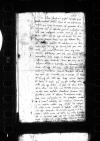List #1372
Helius EOBANUS Hessus (KOCH) do Ioannes DANTISCUSMarburg, [1536]-11-15
| odebrano Cracow (Kraków), [1536]-12-27 Rękopiśmienne podstawy źródłowe:
Publikacje:
| ||||||||||
Tekst + aparat krytyczny + komentarzZwykły tekstTekst + komentarzTekst + aparat krytyczny
Reverendo Domino et principi, domino
Salutem.
Non dubito, clarissime Praesul Dantisce, quin iamd
iam dudum sinistram aliquam de me suspicionem concipias
,
qui tanto iam tempore etiam provocatus ab tua humanitate tibi non respondeam, quod tamen, o clarissime vir, nulla mea neglegentia accidisse utinam tam tibi persuadere written over ...⌈... illegible⌈...... illegible⌉persuaderepersuadere written over ...⌉ possim, quam est verum; nam primum omnium via longa et magna locorum inter nos distantia hoc ipsum fieri stain⌈[i]i stain⌉ saepe prohibet, et volebam, ut me Deus amet, saepe, sed neque per fortunam meam, quae non credis quam mirifice me superinscribed⌈meme superinscribed⌉ exerceat, licuit, neque etiam raritatem tabellariorum potui. Sunt vero omnia vobis principibus viris magis in promptu, quam nobis inferioris notae homunculis. Tamen ... illegible⌈...... illegible⌉, utcumque ista sese habeant, doctissime episcoporum, tuam humanitatem, quae summa est, rogo, hunc virum valde bonum et mihi carissimum doctorem
Mi Dantisce, permitte ut sic tecum loquar, rescribe precor de omnibus tuis rebus et quid etiam in tuo regno agas, ego certe in meo valde ... illegible⌈...... illegible⌉ regie vivo, hoc est — reliqua intelleges. Cetera ex
Tuus


 BCz 240, p. 166
BCz 240, p. 166